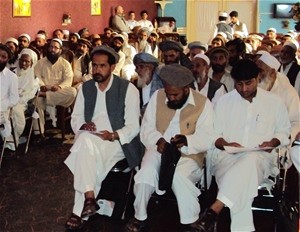
More than 80 elders came together for their first Elders Network Meeting that included participants from the Behsud and Sukh Rod districts in Nangarhar Province.
USAID/RLS-I
Elders convene to discuss local conflicts and how to establish links to the state justice sector.
15 SEPTEMBER 2010 | NANGARHAR PROVINCE, AFGHANISTAN
Long-standing land disputes spanning generations are common in Nangarhar Province. A jirgamar (elder) from Behsud recently recounted a decades-long dispute over a small piece of land situated between two area qwams (tribes). Just recently, an altercation among qwams reignited old arguments, leaving at least five people dead and 30 wounded near Jalalabad, the provincial capital of Nangarhar.
This jirgamar is one of 80 influential jirgamaran (elders) from Behsud and Sukh Rod districts invited to discuss disagreements over land and other disputes destabilizing their communities. The elders’ meeting was a first, organized by USAID’s Rule of Law Stabilization Program—Informal Component, to build a network among elders serving traditional justice roles in Nangarhar. The program supports community-based dispute resolution, linking both traditional and state justice sectors to build capacity and strengthen the rule of law in Afghanistan.
“These sessions create relations between jirgamaran,” said elder Mawlawi Tawakal through a translator. “Through these relationships, we can resolve disputes that are taking a long time to resolve inside villages by ourselves.” Tawakal is also a member of the Behsud district Independent Directorate of Local Governance shura.
The meeting began with jirgamaran discussing their villages’ community-based dispute resolution process. Spin-geree, Pashto for “white beards,” compared various ways they record jirgas’ decisions, and how these are shared with state justice offices. The jirgamaran agreed that meetings should include standardizing forms that can be registered with courts, helping to establish links to the formal justice sector.
“These meetings build links between tribes,” Mohammad Arif, a jirgamar from Behsud district, said. “Discussions identify problems and strengthen relations between the formal justice system and jirga members.”
USAID will sponsor a similar meeting for women jirgamaran in Jalalabad in mid-September. The women’s meeting will focus on strengthening women’s roles in the community-based dispute resolution process.







Comment
Make a general inquiry or suggest an improvement.